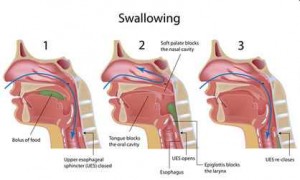Dysphagia (Swallowing Difficulty)
There are around 50 pairs of muscles and many nerves involved in the swallowing process. There are three stages in getting food from the mouth to the stomach.
- The tongue manipulates the food in the mouth to facilitate chewing. This breaks the food into small and manageable pieces while saliva helps soften and moisten the particles ready for swallowing.
- The tongue pushes the food to the, or liquid to the, back of the mouth. This triggers the swallowing reflex which will pass the food through the pharynx to the oesophagus.
- Once food enters the oesophagus it begins the journey to the stomach. Muscles massage the food along the canal and this can take up to three seconds.
Dysphagia can occur if there is a problem with any part of the swallowing process. Muscle weakness, particularly in the tongue or cheeks makes chewing difficult. Neurological issues may prevent the triggering of the swallowing reflex when food should be passed through the pharynx.

This can lead to coughing and choking or food entering the windpipe and the lungs which may result in aspiration pneumonia.
A modified barium swallow (videoflouroscopy) may be used to aid the diagnosis or a fibre-optic laryngoscopy allows the doctor to look down the throat.
While Multiple Sclerosis is not, of itself, normally considered to be a terminal condition; dysphagia IS one of the few symptoms that can in extreme cases cause premature death from choking.
Treatments
Exercise may be used to strengthen weakened muscles. Dietary change may be required for more easily swallowed food types. A speech-language pathologist may assist with developing new swallowing techniques.
In more severe cases medication or surgery may be required to ensure that adequate nutrition is being taken.
References
Dysphagia (swallowing problems) a definition on NHS Choices
Dysphagia is classified as a digestive disorder on WebMD
I have this too, also due to MS. What I do is breath with the intention to help relax the muscles to do with swallowiing. I hope this helps.
Sounds like very good advice Judy, thank you. A good friend of mine, with PPMS, cannot swallow pills at all. He takes them with yoghurt which I don’t condone being dairy-free.